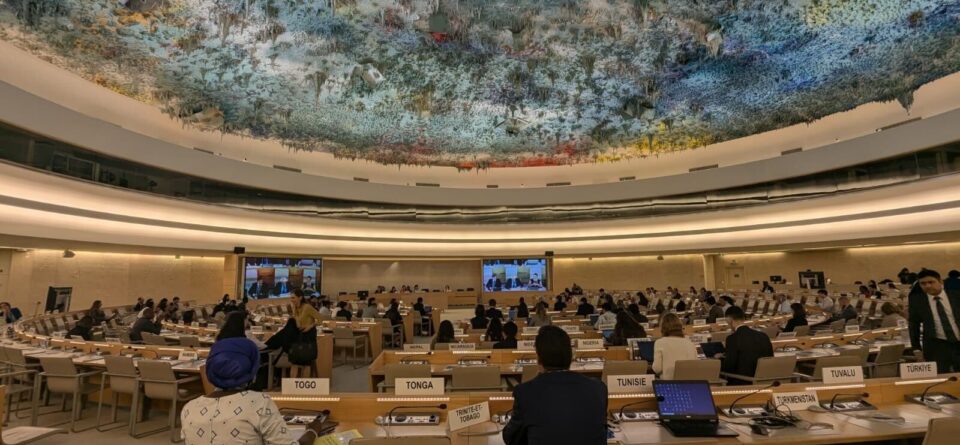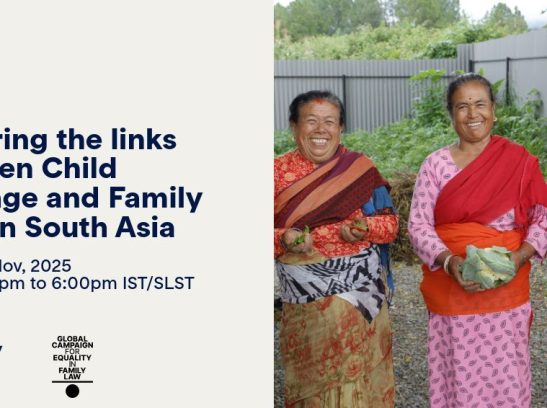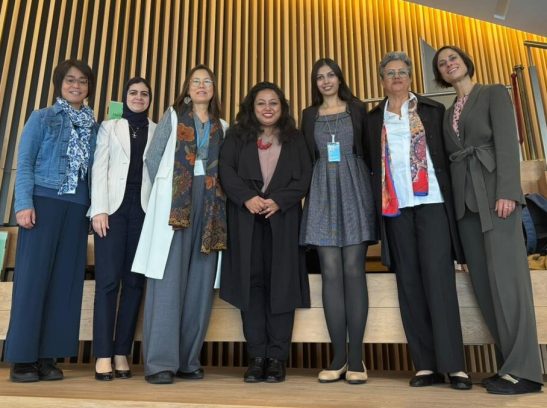The United Nations Human Rights Council, a UN body tasked with promoting and protecting human rights worldwide, last week concluded its 56th session in Geneva, Switzerland. The Global Campaign for Equality in Family Law (GCEFL) was invited as a panelist during the annual full-day discussion on women’s human rights on June 28th on the theme human rights economy and women’s rights.
Speaking on behalf of the Global Campaign, campaign manager Hyshyama Hamin highlighted the ways women and girls globally are affected by discriminatory family laws and practices, which consequently have multiple, intersecting impacts in all other areas of their lives. She stressed that inequality in family law limits women and girls’ right to education, employment, economic independence, and full participation in society, and further increases their risk of gender-based violence and harmful traditional practices such as child and forced marriage.
Women and girls are vulnerable to multiple layers of discrimination because their rights, including economic rights, are hindered in the basic unit of society, the family. When women do work, they may have limited control over their earnings.
Many countries lack provisions for adequately calculating maintenance and alimony, leaving women vulnerable during divorce and the dissolution of marriage. Hyshyama referenced data from UN Women which reveals that, on average, women perform 2.8X more unpaid care work than men – and this contribution is largely invisible and unaccounted for in national economies. This is particularly true in Global South countries where the division of marital property is not recognised or calculated equitably and does not account for women’s unpaid care work and non-monetary contribution to the household.
During critical emergencies, like pandemics, economic and climate crises, and conflict, women experience a sharp increase in informal care work in their families and communities, including child and elderly care and household and communal work.
Progress on family law reform in Sri Lanka
Hyshyama illustrated how these discriminatory laws play out in her home country, Sri Lanka. She explained that the Muslim Marriage and Divorce Act (MMDA) of 1951, which applies to the minority of Muslims in the country, does not require the bride to be present during the marriage ceremonies, nor sign the marriage documents – denying women married under this act autonomy.
Under this act, child marriage continues to be legal, robbing Muslim girls’ of their right to childhood and denying them educational and economic opportunities. Divorce procedures are highly unequal for women; and there are no guidelines to calculate alimony nor the recognition of women’s rights to matrimonial property.
Hyshyama highlighted that there has, however, been some progress. The Ministry of Justice has just announced upcoming reform to the MMDA, which we as GCEFL welcome, and we hope the government of Sri Lanka will soon enact comprehensive reforms on all these issues to ensure greater equality and fulfill its international legal obligations.
The imperative for states to act on family law reform
Hyshyama raised concern about the stagnation of progress globally in the reform of unequal family laws, which according to observations by the GCEFL, is largely delayed and blocked by nationalist, fundamentalist, and conservative groups, often working in tandem with governmental bodies and decision-makers.
In her closing remarks, Hyshyama reiterated that women and girls are doubly affected by inequality and legal discrimination. Not only do they face inequalities at the family and societal level, but these are further exacerbated by the pressures of economic crises and recovery that our countries face from external economic institutions. States that are genuinely invested in upholding women’s human rights cannot have double standards and must examine their actions in the global macroeconomic landscape.
She urged the Human Rights Council and the UN System to heed the Working Group’s report, and push for all Member States to explicitly guarantee gender equality and non-discrimination in the Constitution and in all laws and practices regardless of the form of legal system, prioritize reform of unequal family laws and establish a legal framework of gender equality in the family and ensure that freedom of religion, belief, tradition and customs are never used to discriminate against women and girls in any context.
While it is highly commendable that some governments are taking specific measures to improve women’s access to employment and labor force participation, these will only go so far, if inequality and discrimination that limits women’s autonomy, decision making and economic rights still exists in the basic unit of society – the family.
On the escalating backlash against gender equality
Hyshyama also delivered an oral statement during the Interactive Dialogue of the UN Working Group on Discrimination Against Women and Girls (UN WG DAWG) after they presented their report on the Escalating backlash against gender equality and urgency of reaffirming substantive equality and the human rights of women and girls. Hyshyama raised concern about the stagnation of progress globally in the reform of unequal family laws, which according to observations by the GCEFL, is largely delayed and blocked by nationalist, fundamentalist, and conservative groups, often working in tandem with governmental bodies and decision-makers.
She stressed that given that we are currently observing the 30th Anniversary of the International Year of the Families, we urge the Human Rights Council and the UN System to heed the Working Group’s report released today and push for ALL Member States to:
- Explicitly guarantee gender equality and non-discrimination in the Constitution and in all laws and practices regardless of the form of legal system;
- Prioritise reform of unequal family laws and establish a legal framework of gender equality in the family; and
- Ensure that freedom of religion, belief, tradition and customs are never used to discriminate against women and girls in any context.
Find the full opening statement here, and the full closing remarks here.






